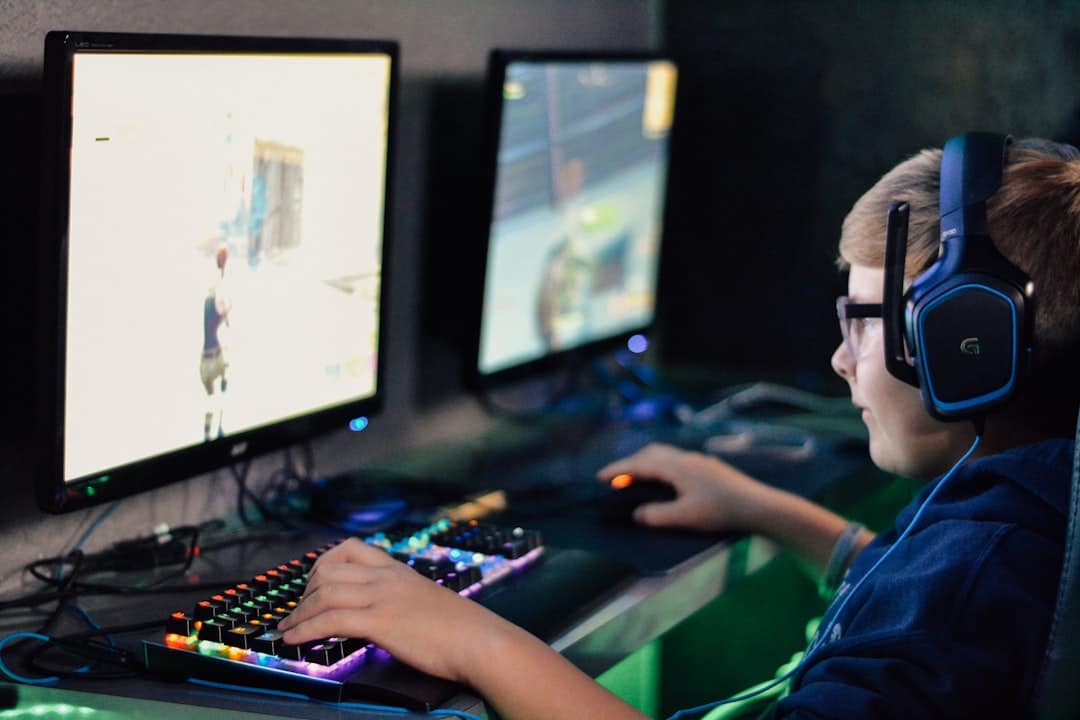Esports, a term that encompasses competitive video gaming, has rapidly evolved from a niche hobby into a global phenomenon.
The rise of esports can be attributed to advancements in technology, the proliferation of high-speed internet, and the increasing accessibility of gaming platforms.
As a result, competitive gaming has transformed into a multi-billion-dollar industry, complete with professional leagues, sponsorships, and massive tournaments that draw in audiences comparable to traditional sports events. This burgeoning landscape has sparked discussions about the potential inclusion of esports in the Olympic Games, a platform that has historically celebrated athletic prowess and international unity. The Olympic Movement, founded on principles of excellence, friendship, and respect, has long been a beacon for athletes across various disciplines.
The Games serve not only as a showcase for physical sports but also as a celebration of cultural exchange and global cooperation. As esports continue to gain traction, the question arises: can this digital competition align with the values and traditions of the Olympic Movement? The intersection of esports and the Olympics presents an intriguing opportunity to redefine what constitutes sport in the modern era.
This article delves into the ongoing debate surrounding esports as a recognized Olympic sport, exploring its potential benefits, challenges, and implications for the future of both the Olympic Games and the esports industry.
Key Takeaways
- Esports is a rapidly growing industry that has gained attention from the Olympic movement in recent years.
- There is a debate over whether esports should be recognized as an official Olympic sport, with concerns about its physical nature and competitive integrity.
- Including esports in the Olympics could bring in a younger audience and increase engagement with the games.
- Challenges of integrating esports into the Olympics include standardizing rules, addressing doping concerns, and ensuring fair competition.
- Esports has the potential to attract a younger audience to the Olympics and complement traditional sports, but it also poses challenges for the existing Olympic framework.
The Debate Over Esports as a Recognized Olympic Sport
The Case for Esports as a Sport
Proponents argue that esports embodies many qualities traditionally associated with sports, such as competition, skill, and teamwork. They point to the rigorous training regimens of professional gamers, who often practice for hours each day to hone their reflexes, strategic thinking, and coordination. Just as athletes in traditional sports undergo physical conditioning, esports competitors engage in mental conditioning and practice to achieve peak performance.
The Counterargument: Lack of Physicality
Critics contend that esports lack the physicality that characterizes traditional sports. They argue that the essence of the Olympics lies in showcasing physical athleticism and endurance, qualities that are not necessarily present in gaming competitions. Additionally, concerns about the potential for addiction, mental health issues, and the overall impact of gaming culture on youth have fueled skepticism regarding esports’ legitimacy as an Olympic discipline.
The Complexity of Esports and Olympic Inclusion
The debate is further complicated by the diverse range of games within the esports ecosystem; not all games emphasize competition in the same way, leading to questions about which titles would be suitable for Olympic inclusion.
The Potential Benefits of Including Esports in the Olympics

Incorporating esports into the Olympic Games could yield numerous benefits for both the Olympic Movement and the esports community. One significant advantage is the potential for increased viewership and engagement among younger audiences. The demographic shift towards digital entertainment consumption is undeniable; younger generations are more likely to engage with video games than traditional sports.
By embracing esports, the Olympics could tap into this vast audience, fostering a new generation of fans who may not have previously engaged with the Games. This could lead to increased sponsorship opportunities and revenue streams for the Olympic Movement. Moreover, including esports could enhance the overall diversity of the Olympic program.
The Games have historically showcased a wide array of sports, from athletics to gymnastics to team sports like basketball and soccer. By adding esports to this mix, the Olympics would reflect contemporary interests and cultural shifts while promoting inclusivity. This diversification could also encourage collaboration between traditional sports organizations and esports entities, leading to innovative partnerships that benefit both sectors.
For instance, traditional athletes could engage with gamers to share training techniques or mental strategies, fostering cross-disciplinary learning that enriches both communities.
The Challenges of Integrating Esports into the Olympic Games
Despite its potential benefits, integrating esports into the Olympic framework presents several challenges that must be addressed. One primary concern is establishing standardized regulations and governance structures for competitive gaming. Unlike traditional sports governed by established international federations with clear rules and regulations, esports is characterized by a fragmented landscape with numerous game publishers and tournament organizers.
This lack of uniformity complicates efforts to create a cohesive structure for Olympic competition. Additionally, there are concerns about ensuring fair play and integrity within esports competitions.
The Olympics have stringent anti-doping regulations in place to maintain fairness among athletes; similar measures would need to be developed for esports competitors. Furthermore, addressing these challenges requires collaboration between various stakeholders, including game developers, tournament organizers, and regulatory bodies. Establishing a framework that satisfies all parties while maintaining the integrity of both esports and the Olympic Movement is no small feat.
The Role of Esports in Attracting a Younger Audience to the Olympics
One of the most compelling arguments for including esports in the Olympics is its potential to attract younger viewers who may feel disconnected from traditional sports. As digital natives, younger generations are accustomed to engaging with content through screens rather than in-person events. By incorporating esports into the Olympic program, organizers could create a bridge between traditional athleticism and modern entertainment preferences.
This shift could revitalize interest in the Olympics among youth who might otherwise overlook the Games in favor of more contemporary forms of entertainment. Moreover, integrating esports could foster a sense of community among young fans who share a passion for gaming. Online platforms allow gamers to connect with one another across geographical boundaries, creating global communities centered around shared interests.
By aligning with this culture, the Olympics could cultivate a more inclusive environment that resonates with younger audiences. Events could be designed to encourage interaction between gamers and traditional athletes, fostering cross-pollination between these two worlds while promoting values such as teamwork and sportsmanship.
The Impact of Esports on Traditional Olympic Sports

The rise of esports has already begun to influence traditional sports in various ways. For instance, many professional sports organizations have started investing in esports teams or creating their own gaming leagues to engage with younger fans. This trend reflects an acknowledgment that gaming is not merely a passing fad but rather an integral part of contemporary culture that can coexist alongside traditional athletic pursuits.
By embracing this evolution, traditional sports can remain relevant in an increasingly digital world. Furthermore, esports can serve as a complementary activity for athletes in traditional sports. Many professional athletes have taken up gaming as a way to unwind or connect with fans during off-seasons or downtime.
This crossover can enhance fan engagement by allowing athletes to showcase their personalities outside their respective sports while also providing an avenue for fans to interact with them in a more casual setting. As such, rather than viewing esports as competition for attention or resources, traditional sports organizations can recognize it as an opportunity for collaboration and innovation.
The Global Growth of Esports and its Influence on Olympic Recognition
The global growth of esports has been nothing short of remarkable over the past decade. Major tournaments like The International (Dota 2), League of Legends World Championship, and Fortnite World Cup have attracted millions of viewers both online and in-person, showcasing the immense popularity of competitive gaming across diverse demographics. This surge in interest has prompted various countries to recognize esports as legitimate sporting activities, leading to increased investment from governments and private entities alike.
As nations begin to embrace esports on an institutional level, there is growing pressure on international organizations like the International Olympic Committee (IOC) to acknowledge this shift. Countries such as South Korea have long been at the forefront of this movement, establishing national teams and training programs dedicated to competitive gaming. The success of these initiatives has demonstrated that esports can foster national pride and unity similar to traditional sports.
As more nations invest in their esports infrastructure, it becomes increasingly difficult for global institutions like the IOC to ignore this burgeoning sector.
The Future of Esports in the Olympic Movement
The future of esports within the Olympic Movement remains uncertain but filled with potential. As discussions continue regarding its inclusion as an official Olympic sport, it is essential for stakeholders from both worlds—traditional athletics and competitive gaming—to engage in constructive dialogue aimed at finding common ground. By addressing concerns related to governance, integrity, and audience engagement while recognizing the unique attributes that esports bring to the table, there is an opportunity for a harmonious integration that benefits both communities.
Ultimately, whether or not esports becomes an official part of the Olympic Games will depend on how effectively these challenges are navigated and how well both sides can adapt to an evolving landscape where digital competition plays an increasingly prominent role in global culture. As we look ahead, it is clear that esports will continue to shape not only its own future but also that of traditional sports and international competitions like the Olympics.
In a recent article on ENICOMP, they discuss the best laptops for video and photo editing, which could be crucial for esports players looking to enhance their skills and create content. With the rise of esports in international recognition, having the right tools and software is essential for success in the industry. Check out their recommendations

